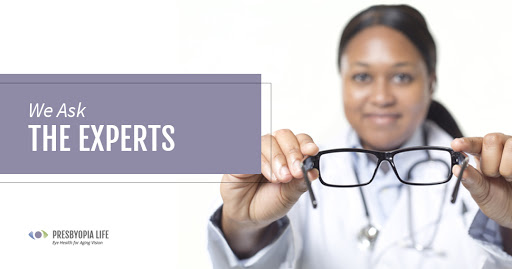Top 10 Presbyopia Questions Answered by Our Experts

Our Vision Experts Answer 10 of Your Questions About Presbyopia
If you start to notice changes in your vision, its normal to have questions! The team at Presbyopia Life includes experienced ophthalmologists and optometrists, and throughout their careers they answered a wide range of patient questions. Now these specialists are sharing their knowledge to answer some frequently asked questions from patients with common presbyopia concerns.
1. I am having trouble reading restaurant menus, seeing prescription bottles, and even clipping my children’s fingernails – what happened to me?
You should check in with your eye doctor any time you experience a change in vision, but if you are over the age of 40, there is a good chance that diminished near vision is a result of presbyopia. This type of near vision loss is age-related, but it can affect people as early as their late-30’s and is not an indication of being elderly!

Read our introduction to presbyopia to learn more about this condition.
2. Things in the dark are getting harder to see, what can I do?
Once you reach your 40’s, it is normal to need more light in order to see well and adding brighter lights to work spaces or reading areas can help.



3. I bought so many pairs of readers and can never find them, should I have LASIK?
LASIK for presbyopia is a complex topic because the standard laser vision correction surgery that someone without presbyopia would have is not the same type of procedure that would be used to treat age-related near vision loss. Currently, the most popular surgical treatment for presbyopia is a type of LASIK called Monovision, but not everyone is a candidate and side effects can include blurred distance vision.

4. I had LASIK 10 years ago, but lately I cannot see well close up. Do I need to repeat LASIK?
When you had LASIK laser eye surgery, your corneas were permanently altered and LASIK does not “wear off”. However, it is common for people who had LASIK earlier in life to develop the need for reading glasses in their 40’s. LASIK does not prevent presbyopia from developing (but it also does not make presbyopia happen earlier or more severely.)

5. I have to make the computer font bigger and bigger. Do I have options besides reading glasses?
The first thing you should know is that extended screen time can cause dry eyes and Digital Eye Strain, so read these tips if you spend a lot of time in front of the computer. Any alternatives to reading glasses will require a trip to your eye doctor. An optometrist or ophthalmologist can discuss with you if you may be a candidate for any surgical procedures to treat presbyopia.
6. Can I do eye exercises to improve my near vision?
No, but this is a common presbyopia myth! Even though exercise can improve function for many parts of your body, this is one area where no amount of “working out” will help. There are no eye exercises to prevent, correct, or reverse presbyopia.

7. Can diet or supplements prevent or reverse presbyopia?
A diet rich in Vitamin C, Vitamin E, Zinc, and Essential Fatty Acids can support overall eye health and may have a positive effect on vision long term.


8. I have never had to wear glasses and I don’t want to start now. I just want to see close up like before, any solution?
If you have been diagnosed with presbyopia, reading glasses are typically the first recommended treatment.


9. I cannot read my Kindle anymore, do I have to wear glasses all the time?
If you never needed glasses before presbyopia, then you probably won’t need glasses for distance vision now – meaning that you’ll only need them for reading and other close-up tasks. If the on-off-on-off pattern of using glasses just for reading becomes a hassle for you, talk to your eye doctor about other options that may be right for you.
10. If my near vision is steadily getting worse, will I eventually go blind?
Presbyopia affects near vision (reading vision) and may have other side effects such as headaches or difficulty seeing in low light.


 Sources
Sources
1The College of Optometrists. Presbyopia. Available: https://lookafteryoureyes.org/eye-conditions/presbyopia/ Accessed: October 30, 2019.
2American Optometric Association. Adult Vision: 41 to 60 Years of Age. Available: https://www.aoa.org/patients-and-public/good-vision-throughout-life/adult-vision-19-to-40-years-of-age/adult-vision-41-to-60-years-of-age Accessed: October 30, 2019.
3 Mendelsohn, A. U.S. News & World Report. Blinded By the Night: Coping With Impaired Night Vision While Driving. Available: https://health.usnews.com/health-care/for-better/articles/2018-05-14/blinded-by-the-night-coping-with-impaired-night-vision-while-driving Accessed: October 30, 2019.
4Healthline. What Are Progressive Lenses, and Are They Right for You? Available https://www.healthline.com/health/what-are-progressive-lenses. Accessed: October 30, 2019
5Geffen D. Presbyopia: The State of Surgical Correction. Review of Cornea and Contact Lenses. Published March 15, 2018.
6American Refractive Surgery Council. Ask The Doctor: How Long Does LASIK Last? Available: https://americanrefractivesurgerycouncil.org/how-long-does-lasik-last/ Accessed: October 30, 2019
7Harvard Health Publishing. The lowdown on eye exercises. https://www.health.harvard.edu/diseases-and-conditions/the-lowdown-on-eye-exercises Accessed October 30, 2019.
8American Optometric Association. Diet and Nutrition. Available:https://www.aoa.org/patients-and-public/caring-for-your-vision/diet-and-nutrition Accessed October 31, 2019
9Harvard Health Publishing. Presbyopia, What is it? Available:https://www.health.harvard.edu/a_to_z/presbyopia-a-to-z Accessed October 31, 2019
10American Optometric Association. Recommended Eye Examination Frequency for Pediatric Patients and Adults. Available: https://www.aoa.org/patients-and-public/caring-for-your-vision/comprehensive-eye-and-vision-examination/recommended-examination-frequency-for-pediatric-patients-and-adults. Accessed October 31, 2019




